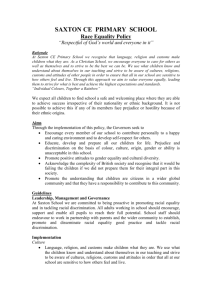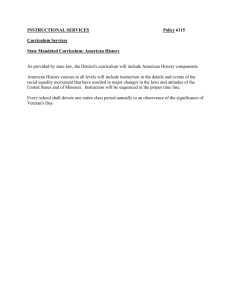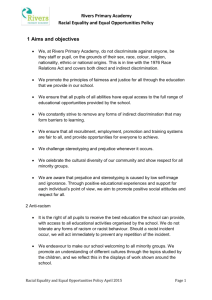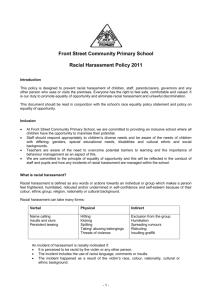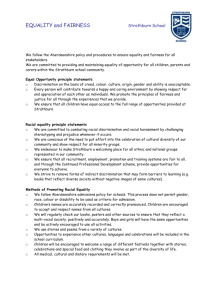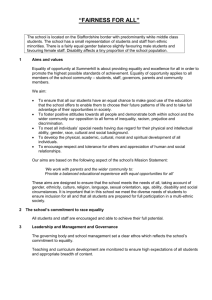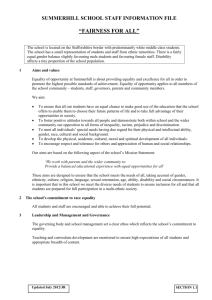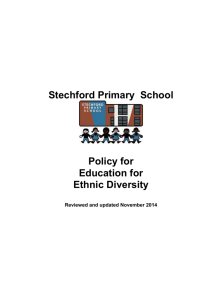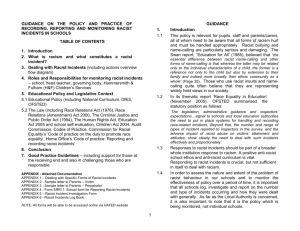Race Equality Policy - Tutshill C of E primary School
advertisement
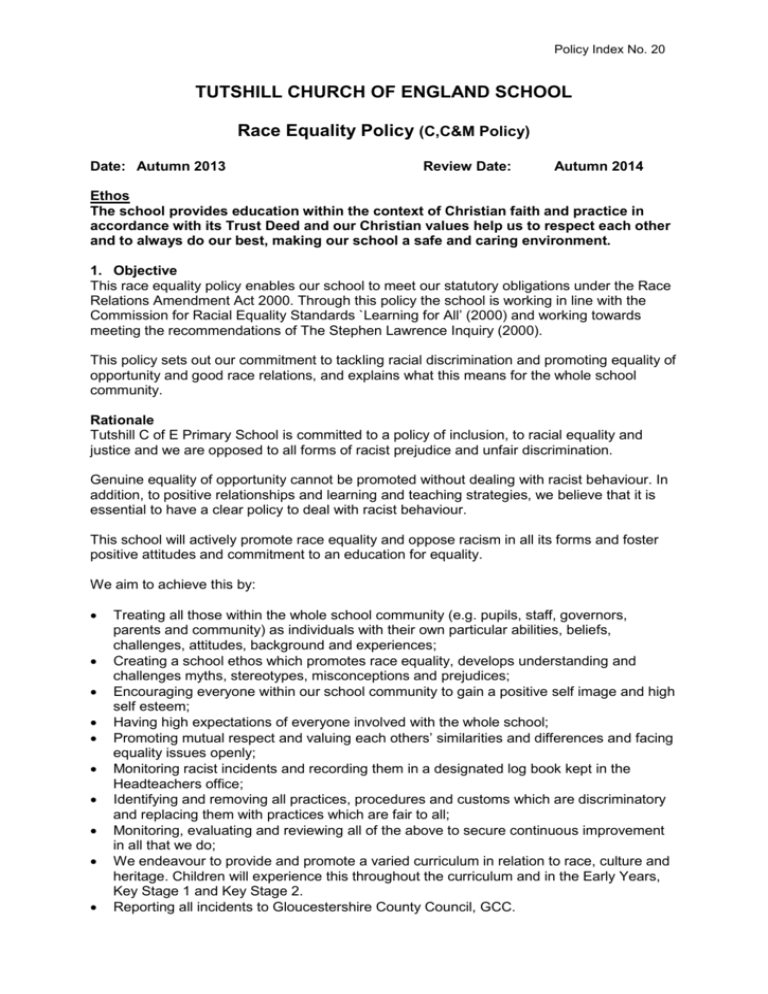
Policy Index No. 20 TUTSHILL CHURCH OF ENGLAND SCHOOL Race Equality Policy (C,C&M Policy) Date: Autumn 2013 Review Date: Autumn 2014 Ethos The school provides education within the context of Christian faith and practice in accordance with its Trust Deed and our Christian values help us to respect each other and to always do our best, making our school a safe and caring environment. 1. Objective This race equality policy enables our school to meet our statutory obligations under the Race Relations Amendment Act 2000. Through this policy the school is working in line with the Commission for Racial Equality Standards `Learning for All’ (2000) and working towards meeting the recommendations of The Stephen Lawrence Inquiry (2000). This policy sets out our commitment to tackling racial discrimination and promoting equality of opportunity and good race relations, and explains what this means for the whole school community. Rationale Tutshill C of E Primary School is committed to a policy of inclusion, to racial equality and justice and we are opposed to all forms of racist prejudice and unfair discrimination. Genuine equality of opportunity cannot be promoted without dealing with racist behaviour. In addition, to positive relationships and learning and teaching strategies, we believe that it is essential to have a clear policy to deal with racist behaviour. This school will actively promote race equality and oppose racism in all its forms and foster positive attitudes and commitment to an education for equality. We aim to achieve this by: Treating all those within the whole school community (e.g. pupils, staff, governors, parents and community) as individuals with their own particular abilities, beliefs, challenges, attitudes, background and experiences; Creating a school ethos which promotes race equality, develops understanding and challenges myths, stereotypes, misconceptions and prejudices; Encouraging everyone within our school community to gain a positive self image and high self esteem; Having high expectations of everyone involved with the whole school; Promoting mutual respect and valuing each others’ similarities and differences and facing equality issues openly; Monitoring racist incidents and recording them in a designated log book kept in the Headteachers office; Identifying and removing all practices, procedures and customs which are discriminatory and replacing them with practices which are fair to all; Monitoring, evaluating and reviewing all of the above to secure continuous improvement in all that we do; We endeavour to provide and promote a varied curriculum in relation to race, culture and heritage. Children will experience this throughout the curriculum and in the Early Years, Key Stage 1 and Key Stage 2. Reporting all incidents to Gloucestershire County Council, GCC. 2. Aims Within Tutshill C of E Primary School we want: All children and learners to feel safe to learn, play or be with others free from racial harassment or prejudice. All children, learners, parents and carers to be treated fairly with respect and dignity. Principles We define racist behaviour or harassment as any unpleasant or bad behaviour against others because of their skin colour, religion, language, accent or cultural background. Different types of harassment or behaviour might include: Physical: hitting, kicking, spitting, taking or damaging belongings and threats of violence. Verbal or visual: name calling, insults, teasing, making fun or jokes about (including graffiti, leaflets, magazines, comics, books and badges). Indirect: excluding (leaving out on purpose), humiliating, spreading nasty rumours, laughing at Such behaviour can severely affect a child’s ability to learn effectively and the effect of harassment can remain with a person throughout their life. 3. Every child matters outcomes Through teaching we aim to give children the opportunities to achieve the government’s 7 ‘Every Child matters’ outcomes Staying safe Being healthy Enjoying & achieving Making a positive contribution Achieving economic well-being Behaviour Spiritual, Moral, Social, Cultural 4. Roles and Responsibilities – actions of key staff Responsibilities The governing body will ensure that the school complies with the duty under the Race Relations (Amendment) Act and that its policies and related strategies and procedures are implemented. The Headteacher is accountable to the Governing Body for the implementation of the policy and ensuring all staff are aware of their responsibilities and given training and support. The Headteacher has specific responsibility for co-ordinating racial equality across the school and for dealing with specific racist incidents and reporting to the GCC. All staff are responsible for dealing with racist incidents, challenging racial bias and stereotyping, promoting equality and keeping up to date with race relations legislation by attending training. Visitors will be made aware of their responsibility to comply with the school’s policy. 5. Implementation Breaches of the policy These will be dealt with, in the first instance by the Headteacher and referred to the appropriate committee of the Governing Body. Please refer to the PSP and Staff Discipline Policies. Policy, planning, review Ethnic monitoring data will be used to monitor the attainment and progress of pupils by racial group and set targets as part of strategic plans. The governors will share the information with the school community through the school profile which features on the website and in the school evaluation form. Making a Judgement Judging whether racism is intentional is difficult in all circumstances. Some children can be racist without knowing what racism means. Often the most important indication of racist behaviour is whether the victim (or family particularly for young children) themselves believe that they have been subjected to racial harassment. We want children to tell us if they have a problem with racist behaviour and what they say will be taken seriously. We will try to make sure that those who deal with the problem understand and take care in handling the issues. Sanctions If a child acts in a racist manner or racially harasses someone Disciplinary action may be taken in line with the schools behaviour management policy. This could include: a) explaining why their actions are wrong and warn them not to do it again; b) loss of Golden Time c) parents/carers being notified by a telephone call in the first instance; d) if the child has repeated the behaviour after being warned, a letter will be sent to their parents/carers and they will be invited in to discuss the racist behaviour with the Headteacher e) In very cases eg. Violence and inciting racism, the child will be excluded immediately, parents informed and the police may be contacted. The appropriate sanction will relate to the severity of the incident eg telephone call home, meeting with parents, internal exclusion. Reporting an Incident Incidents in which children are involved: If a chid is a recipient of racial harassment on school premises or outside of school if this is deemed to be a relevant and important issue, from another pupil, he or she should report this to the Class Teacher. The incident will be reported to the Headteacher and the information passed on to the local authority. Incidents in which an adult is involved: If a pupil is a recipient of racial harassment on school premises, from an adult or a member of staff, he or she should report this to the Class Teacher. If the complaint is against the parent for racial harassment on school premises the incident should be reported by the victim to the Head Teacher. If the Headteacher is implicated the complaint should be handled by the Chair of Governors. The incident will be reported to the Head Teacher and the information passed on to the local authority. Incidents in which a Governor is involved; If a Governor is a recipient of racial harassment on school premises from a pupil, member of staff or other member of the Governing Body, then he or she should report this to the Head Teacher. If the complaint is against a Governor then the incident should be reported to the Corporate Director of Education (CDE). Incidents which involve outside contractors. The incident should be reported to the individual’s line manager or supervisor, with a clear expectation of an investigation and report back. This may include a subsequent meeting with all those involved. Monitoring, evaluation and review The school will review this policy annually and assess its implementation and effectiveness. The policy will be promoted and implemented throughout the school and any incidences of racial harassment reported to the Governing Body. 6. Relationship to other policies Equal Opportunities policy Child Protection Policy 7. Health and Safety Refer to the Health & Safety Policy 8. Equality / Inclusion – The school recognises that it has to make special efforts to ensure that all groups prosper, including those with special educational needs; who have difficulties accessing the school or services; who speak English as an additional language; who have frequent moves and lack stability leading to time out of school (e.g. children in care); who as children are caring for others; who come from homes with low income and/or in adequate home study space; who experience bullying, harassment or social exclusion; with low parental support or different parent expectations; with emotional, mental and physical well being needs; who exhibit challenging behaviour; who come from ethnic minority groups including travellers, refugees and asylum seekers. Reviewed in accordance with the DDA. Document reviewed by C, C & M Committee Name: ……………………………… (Governor) Signature: ………………………….. Date: ………………………………...
